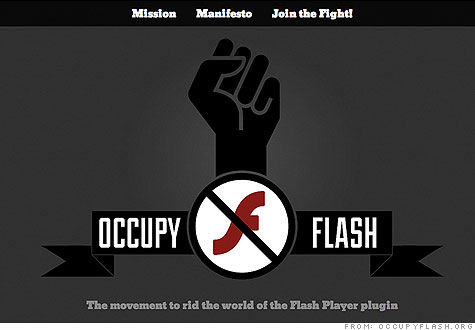'Occupy Flash' Aims to End the Tyranny of Adobe's Plug-In
The name is crass, but the sentiment is appreciated
Where once it bestrode the Internet like a Colossus, Adobe's ubiquitous Flash plug-in has finally begun to fall on hard times. Shortly after Adobe announced its decision to halt development on the mobile version of Flash, a group calling itself 'Occupy Flash' - ignore for now the fact that the same trivializes a rather urgent societal economic problem - has piled in on them in aggressive terms normally reserved for political screeds.
"Flash Player is dead," Occupy Flash's manifesto reads. "Its time has passed. It's buggy. It crashes a lot. It requires constant security updates."
Occupy Flash's take on Adobe ranges from technical to personal. "It's a fossil, left over from the era of closed standards and unilateral corporate control of web technology. Websites that rely on Flash present a completely inconsistent (and often unusable) experience for fast-growing percentage of the users who don't use a desktop browser."
Also singling out security flaws, they're in the same camp with the late Steve Jobs, who started his own spat with Adobe in 2010, calling Adobe 'lazy' and later, publishing a lengthy post on Apple.com, further articulating his beef with the Flash plug-in.
Occupy Flash acknowledges that Adobe, by abandoning mobile Flash to focus on HTML 5 in future mobile development, would appear to have become irrelevant. However, their goal, cheekily focused on encouraging Internet users to deactivate the Flash plug-in in their desktop browsers, is larger than any one company. Simply put, they aim to force a completely open standard on the web by encouraging users to 'invalidate' technologies that don't meet such standards. Will it work? It's a worthy goal likely to be slow-going, at least while so much of the non-mobile web runs on Flash, admittedly render many websites, like Google Analytics, less usable. (Full disclosure - I won't be deactivating Flash, at least not now). But as the intent isn't to kneecap Adobe as an entity, only to speed up the transition to an HTML 5 future, a 'movement', if you can call it that, like Occupy Flash might put pressure on developers to do just that.
Get Tom's Hardware's best news and in-depth reviews, straight to your inbox.
-
mcd023 so if an alternative comes out, what you've happily used for years becomes tyranny. Am I the only one who thinks that this word is overused?Reply -
Hellbound This is kinda pointless since flash use has been declining for some time.. More and more are using html 5.Reply
Call me when there's an Occupy Apple..... -
killerclick Go to hell occupiers, if a nerd tells me to disable flash, I'll punch him in the nose.Reply -
gmcizzle lol. Is every protest/movement going to just slap "Occupy" at the front now? Unless they're gathering at Adobe headquarters, it just sounds stupid.Reply -
jimmysmitty mcd023so if an alternative comes out, what you've happily used for years becomes tyranny. Am I the only one who thinks that this word is overused?Reply
Not quite that. FLash was great years ago but after Adobe bought Macromedia, Flash slowly became pretty bad and even now its annoying.
And yes, HTML5 is better so why not push towards it instead of trying to hold onto something tat is no longer the best option? -
greatsaltedone That's just offensive to the Occupy movement. Internet software is one of the truest forms of capitalism because of the amount of information out there, so it actually works. There's no cronyism here so they shouldn't be using the name.Reply
asshats. -
KonstantinDK If we nt talk about video, but cartoons and games, flash still can do more than HTML5 if I'm not mistaken.Reply -
STravis killerclickGo to hell occupiers, if a nerd tells me to disable flash, I'll punch him in the nose.Reply
Easy there chief... -
_Pez_ hmm what have I been missing ? Why suddenly (at least for me) everyone hates Flash player from Adobe.. would you mind telling me why ?.Reply
Thank you.
